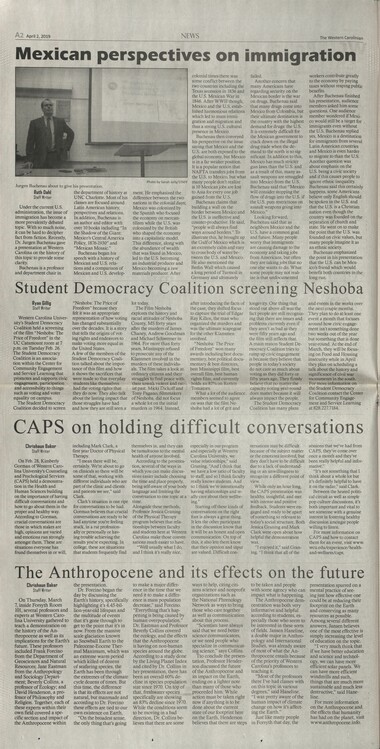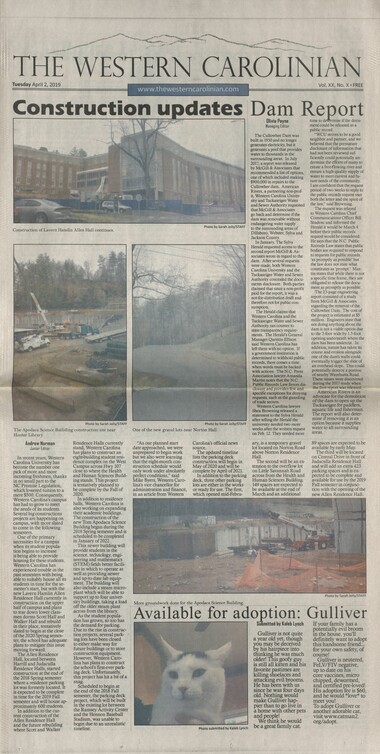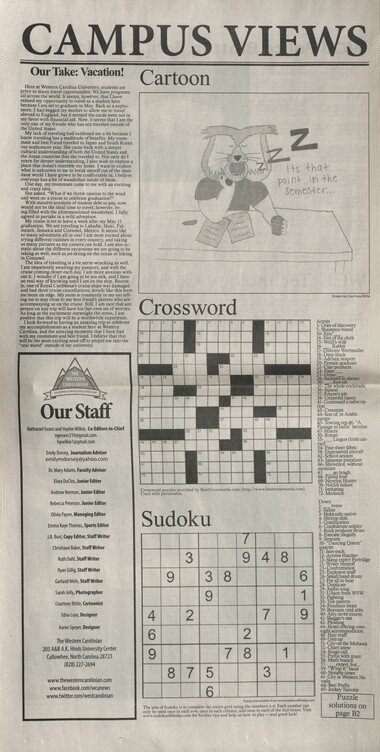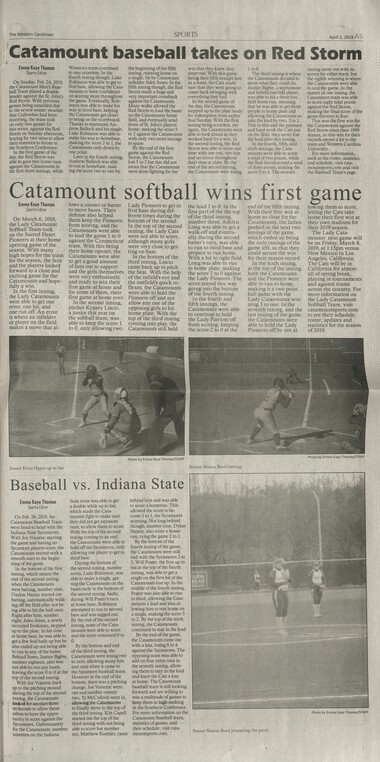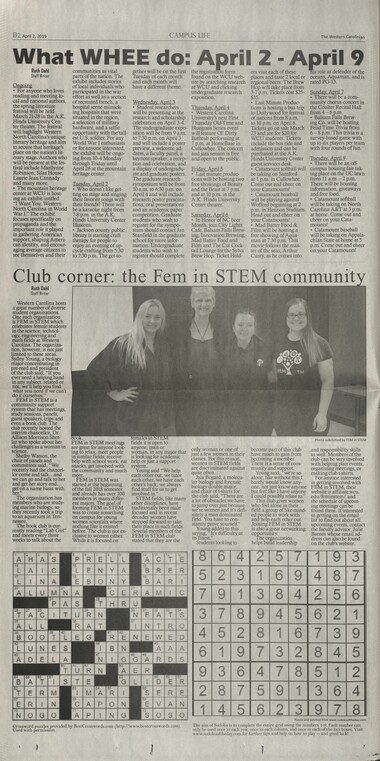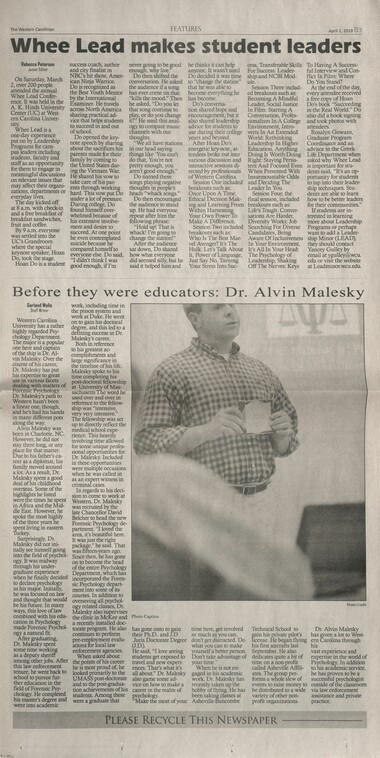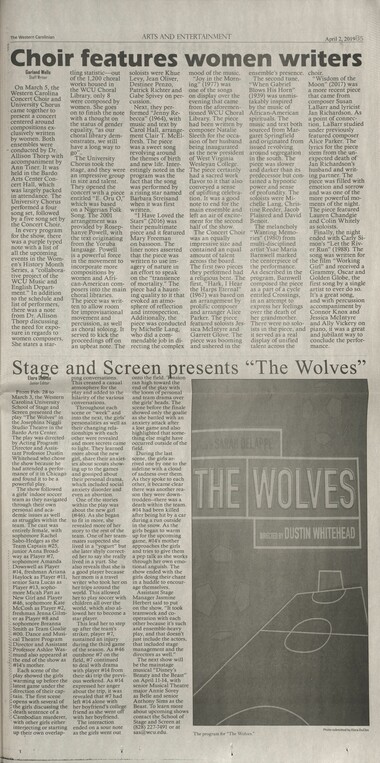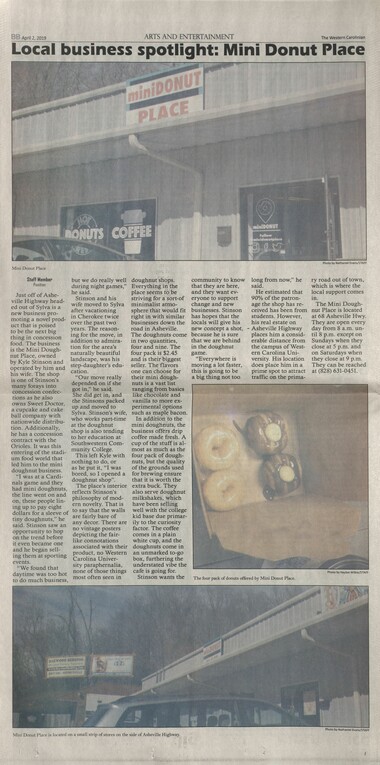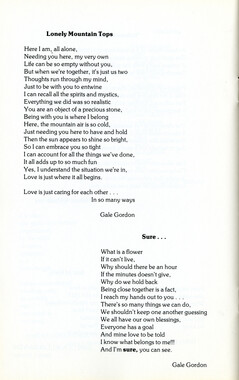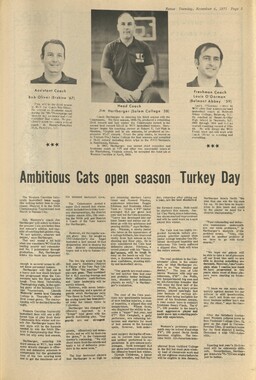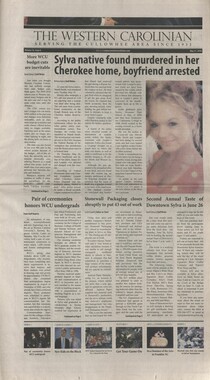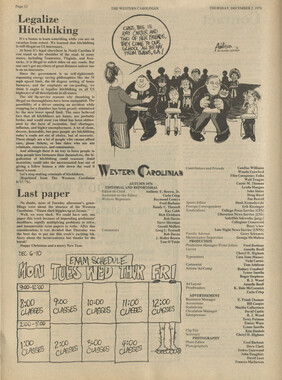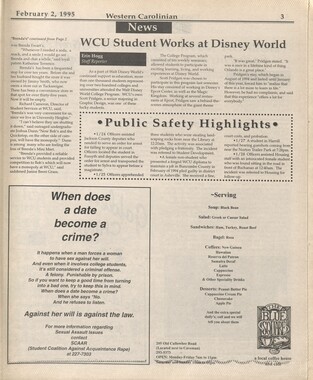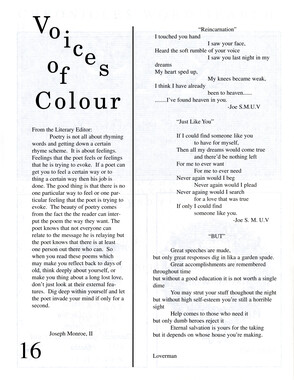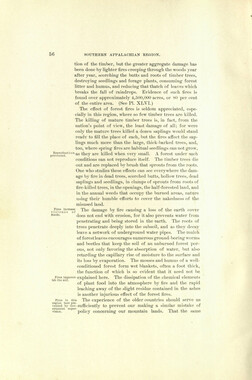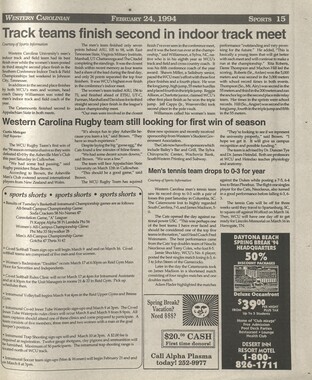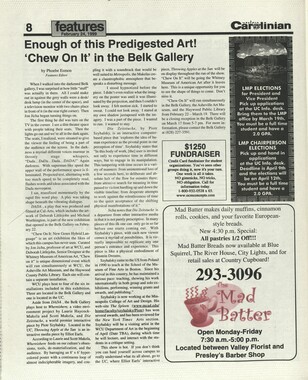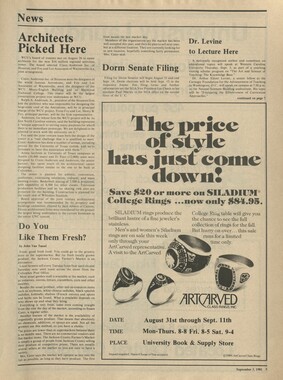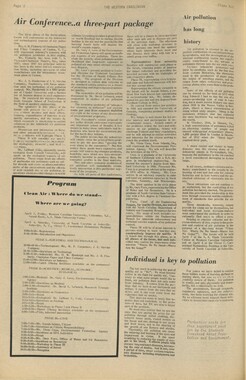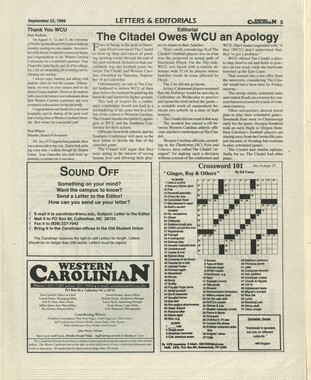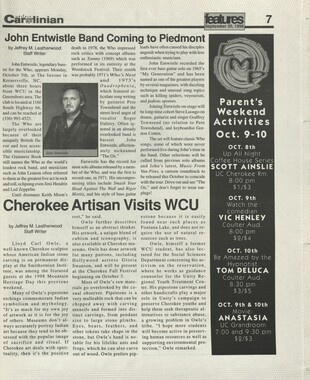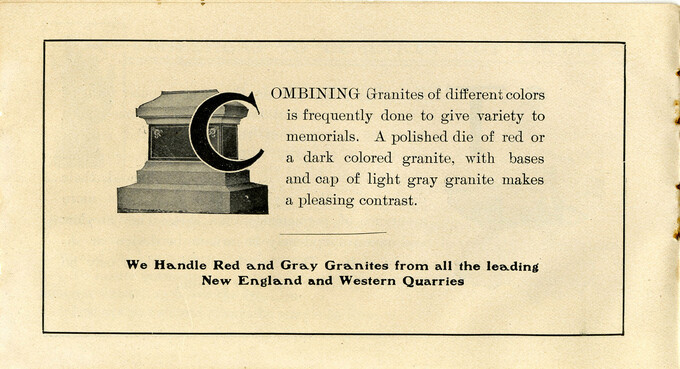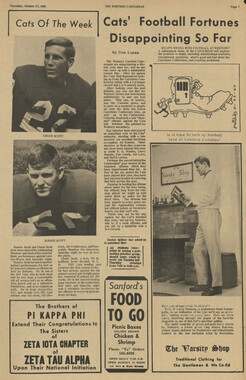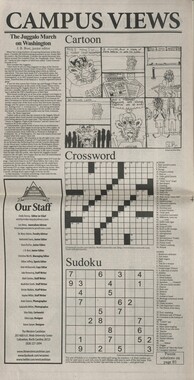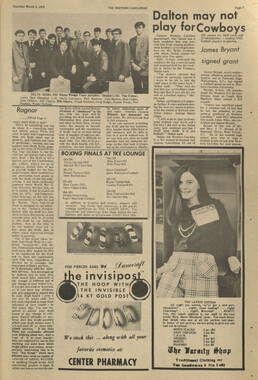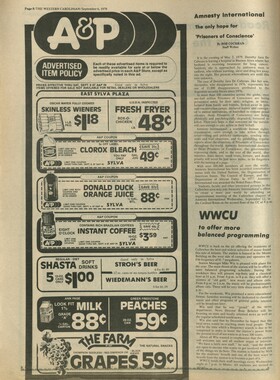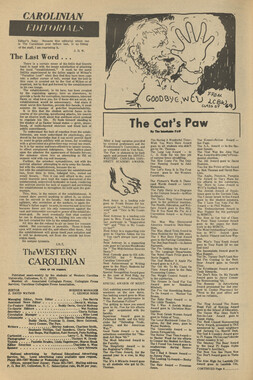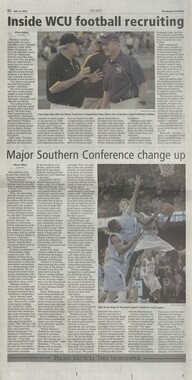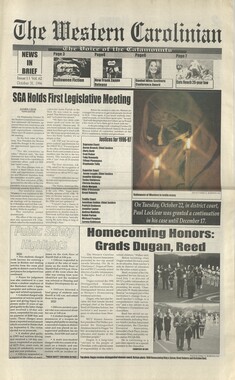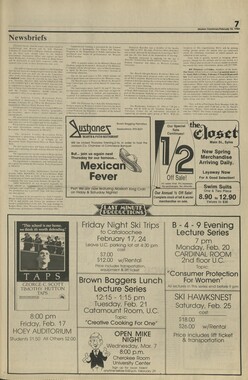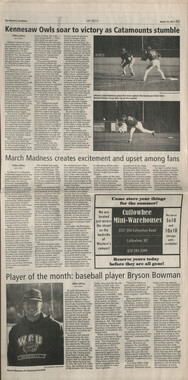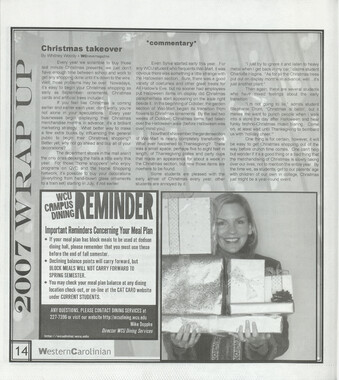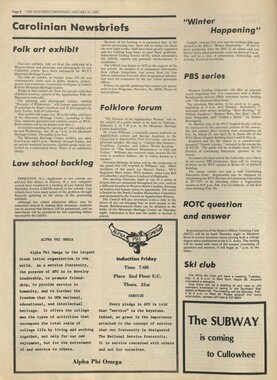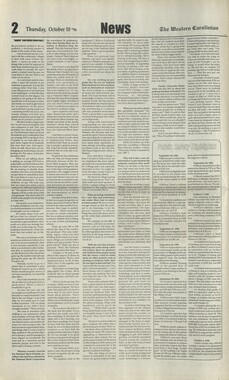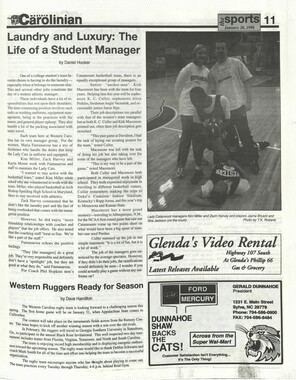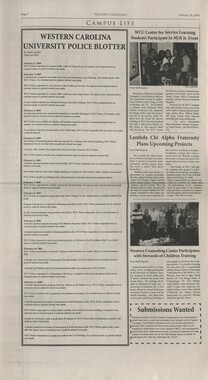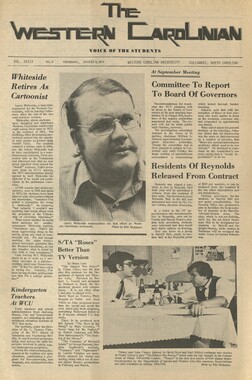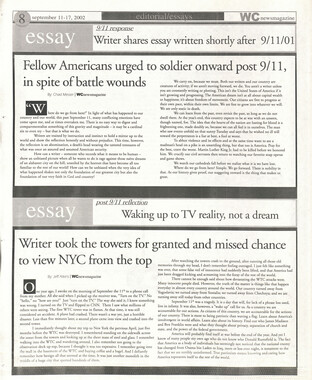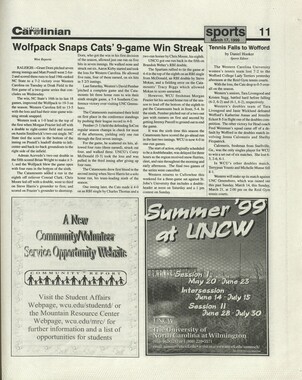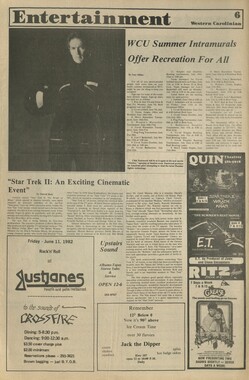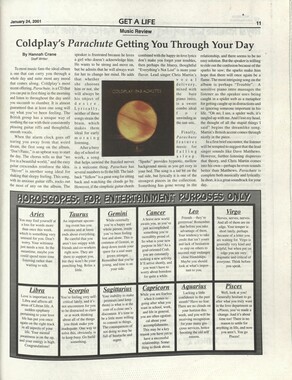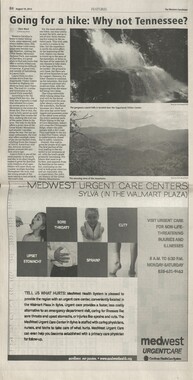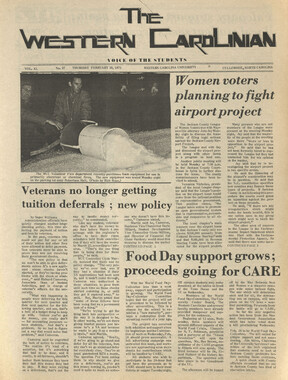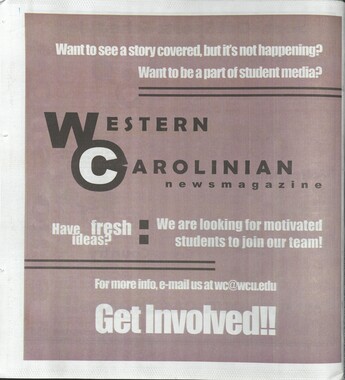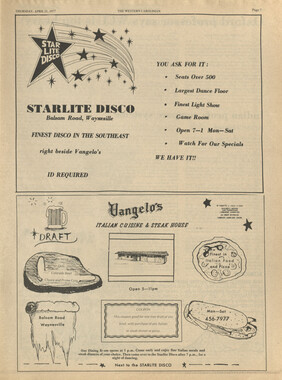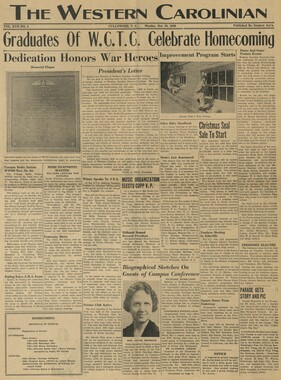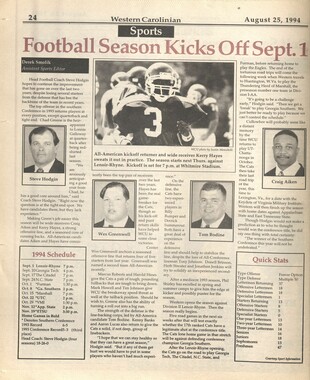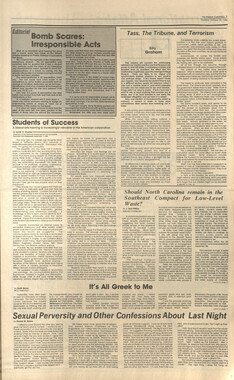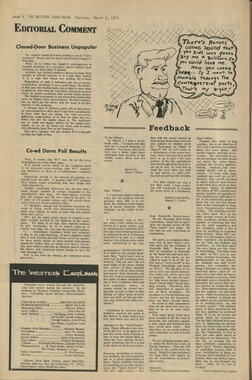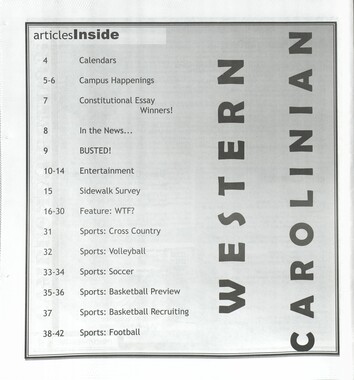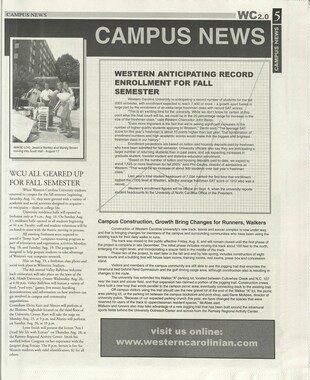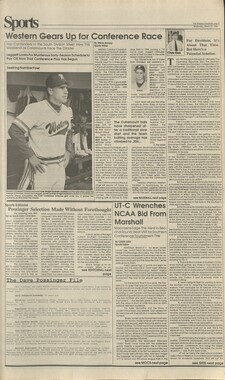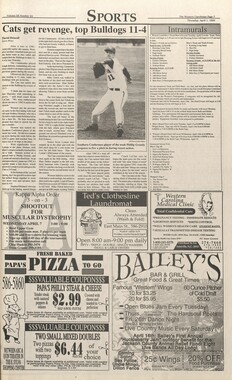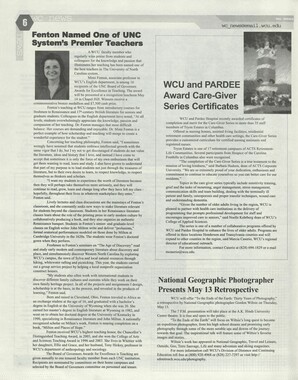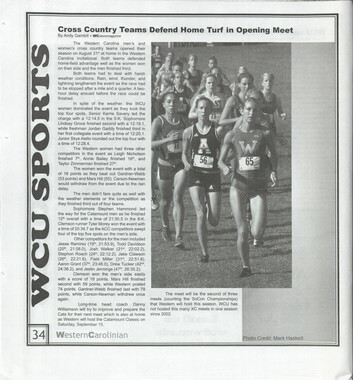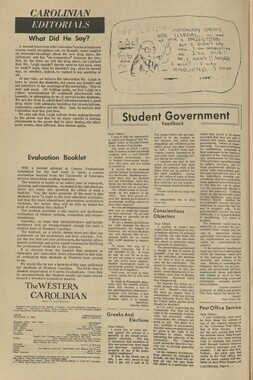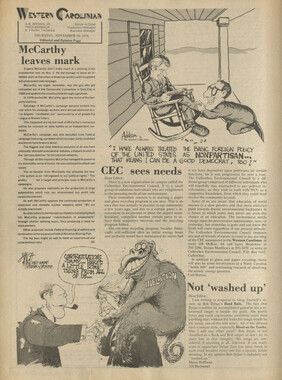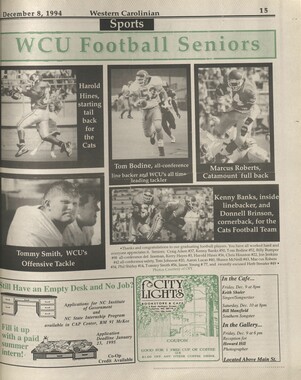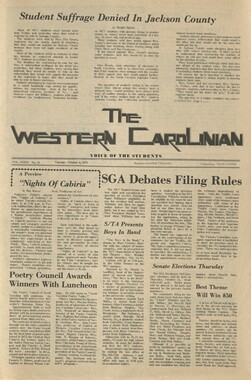Western Carolina University (21)
View all
- Canton Champion Fibre Company (2308)
- Cherokee Traditions (291)
- Civil War in Southern Appalachia (165)
- Craft Revival (1942)
- George Masa Collection (137)
- Great Smoky Mountains - A Park for America (2900)
- Highlights from Western Carolina University (422)
- Horace Kephart (973)
- Journeys Through Jackson (159)
- LGBTQIA+ Archive of Jackson County (85)
- Oral Histories of Western North Carolina (316)
- Picturing Appalachia (6797)
- Stories of Mountain Folk (413)
- Travel Western North Carolina (153)
- Western Carolina University Fine Art Museum Vitreograph Collection (129)
- Western Carolina University Herbarium (92)
- Western Carolina University: Making Memories (738)
- Western Carolina University Publications (2491)
- Western Carolina University Restricted Electronic Theses and Dissertations (146)
- Western North Carolina Regional Maps (71)
- World War II in Southern Appalachia (131)
University of North Carolina Asheville (6)
View all
- Allanstand Cottage Industries (62)
- Appalachian National Park Association (53)
- Bennett, Kelly, 1890-1974 (1463)
- Berry, Walter (76)
- Brasstown Carvers (40)
- Carver, George Washington, 1864?-1943 (26)
- Cathey, Joseph, 1803-1874 (1)
- Champion Fibre Company (233)
- Champion Paper and Fibre Company (297)
- Cherokee Indian Fair Association (16)
- Cherokee Language Program (22)
- Crowe, Amanda (40)
- Edmonston, Thomas Benton, 1842-1907 (7)
- Ensley, A. L. (Abraham Lincoln), 1865-1948 (275)
- Fromer, Irving Rhodes, 1913-1994 (70)
- George Butz (BFS 1907) (46)
- Goodrich, Frances Louisa (120)
- Grant, George Alexander, 1891-1964 (96)
- Heard, Marian Gladys (60)
- Kephart, Calvin, 1883-1969 (15)
- Kephart, Horace, 1862-1931 (313)
- Kephart, Laura, 1862-1954 (67)
- Laney, Gideon Thomas, 1889-1976 (439)
- Masa, George, 1881-1933 (61)
- McElhinney, William Julian, 1896-1953 (44)
- Niggli, Josephina, 1910-1983 (10)
- North Carolina Park Commission (105)
- Osborne, Kezia Stradley (9)
- Owens, Samuel Robert, 1918-1995 (11)
- Penland Weavers and Potters (36)
- Roberts, Vivienne (15)
- Roth, Albert, 1890-1974 (142)
- Schenck, Carl Alwin, 1868-1955 (1)
- Sherrill's Photography Studio (2565)
- Southern Highland Handicraft Guild (127)
- Southern Highlanders, Inc. (71)
- Stalcup, Jesse Bryson (46)
- Stearns, I. K. (213)
- Thompson, James Edward, 1880-1976 (226)
- United States. Indian Arts and Crafts Board (130)
- USFS (683)
- Vance, Zebulon Baird, 1830-1894 (1)
- Weaver, Zebulon, 1872-1948 (58)
- Western Carolina College (230)
- Western Carolina Teachers College (282)
- Western Carolina University (2008)
- Western Carolina University. Mountain Heritage Center (18)
- Whitman, Walt, 1819-1892 (10)
- Wilburn, Hiram Coleman, 1880-1967 (73)
- Williams, Isadora (3)
- Cain, Doreyl Ammons (0)
- Crittenden, Lorraine (0)
- Rhodes, Judy (0)
- Smith, Edward Clark (0)
- Appalachian Region, Southern (2940)
- Asheville (N.C.) (1944)
- Avery County (N.C.) (26)
- Blount County (Tenn.) (195)
- Buncombe County (N.C.) (1680)
- Cherokee County (N.C.) (283)
- Clay County (N.C.) (556)
- Graham County (N.C.) (238)
- Great Smoky Mountains National Park (N.C. and Tenn.) (525)
- Haywood County (N.C.) (3573)
- Henderson County (N.C.) (70)
- Jackson County (N.C.) (4919)
- Knox County (Tenn.) (35)
- Knoxville (Tenn.) (13)
- Lake Santeetlah (N.C.) (10)
- Macon County (N.C.) (421)
- Madison County (N.C.) (216)
- McDowell County (N.C.) (39)
- Mitchell County (N.C.) (135)
- Polk County (N.C.) (35)
- Qualla Boundary (982)
- Rutherford County (N.C.) (78)
- Swain County (N.C.) (2185)
- Transylvania County (N.C.) (270)
- Watauga County (N.C.) (12)
- Waynesville (N.C.) (86)
- Yancey County (N.C.) (72)
- Aerial Photographs (3)
- Aerial Views (60)
- Albums (books) (4)
- Articles (1)
- Artifacts (object Genre) (228)
- Bibliographies (1)
- Biography (general Genre) (2)
- Cards (information Artifacts) (38)
- Clippings (information Artifacts) (192)
- Copybooks (instructional Materials) (3)
- Crafts (art Genres) (622)
- Depictions (visual Works) (21)
- Design Drawings (1)
- Digital Moving Image Formats (2)
- Drawings (visual Works) (185)
- Envelopes (101)
- Exhibitions (events) (1)
- Facsimiles (reproductions) (1)
- Fiction (general Genre) (4)
- Financial Records (12)
- Fliers (printed Matter) (67)
- Glass Plate Negatives (381)
- Guidebooks (2)
- Internegatives (10)
- Interviews (817)
- Land Surveys (102)
- Letters (correspondence) (1045)
- Manuscripts (documents) (618)
- Maps (documents) (177)
- Memorandums (25)
- Minutes (administrative Records) (59)
- Negatives (photographs) (6090)
- Newsletters (1290)
- Newspapers (2)
- Notebooks (8)
- Occupation Currency (1)
- Paintings (visual Works) (1)
- Pen And Ink Drawings (1)
- Periodicals (193)
- Personal Narratives (10)
- Photographs (12976)
- Plans (maps) (1)
- Poetry (6)
- Portraits (4568)
- Postcards (329)
- Programs (documents) (181)
- Publications (documents) (2444)
- Questionnaires (65)
- Relief Prints (26)
- Sayings (literary Genre) (1)
- Scrapbooks (282)
- Sheet Music (2)
- Slides (photographs) (402)
- Songs (musical Compositions) (2)
- Sound Recordings (796)
- Specimens (92)
- Speeches (documents) (18)
- Tintypes (photographs) (8)
- Transcripts (324)
- Text Messages (0)
- A.L. Ensley Collection (275)
- Appalachian Industrial School Records (7)
- Appalachian National Park Association Records (336)
- Axley-Meroney Collection (2)
- Bayard Wootten Photograph Collection (20)
- Bethel Rural Community Organization Collection (7)
- Blumer Collection (5)
- C.W. Slagle Collection (20)
- Canton Area Historical Museum (2110)
- Carlos C. Campbell Collection (462)
- Cataloochee History Project (64)
- Cherokee Studies Collection (4)
- Daisy Dame Photograph Album (5)
- Daniel Boone VI Collection (1)
- Doris Ulmann Photograph Collection (112)
- Elizabeth H. Lasley Collection (1)
- Elizabeth Woolworth Szold Fleharty Collection (4)
- Frank Fry Collection (95)
- George Masa Collection (173)
- Gideon Laney Collection (452)
- Hazel Scarborough Collection (2)
- Hiram C. Wilburn Papers (28)
- Historic Photographs Collection (236)
- Horace Kephart Collection (861)
- Humbard Collection (33)
- Hunter and Weaver Families Collection (1)
- I. D. Blumenthal Collection (4)
- Isadora Williams Collection (4)
- Jesse Bryson Stalcup Collection (47)
- Jim Thompson Collection (224)
- John B. Battle Collection (7)
- John C. Campbell Folk School Records (80)
- John Parris Collection (6)
- Judaculla Rock project (2)
- Kelly Bennett Collection (1482)
- Love Family Papers (11)
- Major Wiley Parris Civil War Letters (3)
- Map Collection (12)
- McFee-Misemer Civil War Letters (34)
- Mountain Heritage Center Collection (4)
- Norburn - Robertson - Thomson Families Collection (44)
- Pauline Hood Collection (7)
- Pre-Guild Collection (2)
- Qualla Arts and Crafts Mutual Collection (12)
- R.A. Romanes Collection (681)
- Rosser H. Taylor Collection (1)
- Samuel Robert Owens Collection (94)
- Sara Madison Collection (144)
- Sherrill Studio Photo Collection (2558)
- Smoky Mountains Hiking Club Collection (616)
- Stories of Mountain Folk - Radio Programs (374)
- The Reporter, Western Carolina University (510)
- Venoy and Elizabeth Reed Collection (16)
- WCU Gender and Sexuality Oral History Project (32)
- WCU Mountain Heritage Center Oral Histories (25)
- WCU Oral History Collection - Mountain People, Mountain Lives (71)
- WCU Students Newspapers Collection (1923)
- Western North Carolina Tomorrow Black Oral History Project (69)
- William Williams Stringfield Collection (2)
- Zebulon Weaver Collection (109)
- African Americans (390)
- Appalachian Trail (35)
- Artisans (521)
- Cherokee art (84)
- Cherokee artists -- North Carolina (10)
- Cherokee language (21)
- Cherokee pottery (101)
- Cherokee women (208)
- Church buildings (190)
- Civilian Conservation Corps (U.S.) (111)
- College student newspapers and periodicals (2012)
- Dams (108)
- Dance (1023)
- Education (222)
- Floods (63)
- Folk music (1015)
- Forced removal, 1813-1903 (2)
- Forest conservation (220)
- Forests and forestry (1197)
- Gender nonconformity (4)
- Great Smoky Mountains National Park (N.C. and Tenn.) (181)
- Hunting (46)
- Landscape photography (25)
- Logging (119)
- Maps (83)
- Mines and mineral resources (9)
- North Carolina -- Maps (18)
- Paper industry (38)
- Postcards (255)
- Pottery (135)
- Railroad trains (72)
- Rural electrification -- North Carolina, Western (3)
- School integration -- Southern States (2)
- Segregation -- North Carolina, Western (5)
- Slavery (5)
- Sports (452)
- Storytelling (243)
- Waterfalls -- Great Smoky Mountains (N.C. and Tenn.) (66)
- Weaving -- Appalachian Region, Southern (280)
- Wood-carving -- Appalachian Region, Southern (328)
- World War, 1939-1945 (173)
Western Carolinian Volume 20 (89) Number 10 (02)
Item
Item’s are ‘child’ level descriptions to ‘parent’ objects, (e.g. one page of a whole book).
-
-
A2 april 2, 2019 NEWS The Western een Mexican perspectives on immigration Jurgen Buchenau about to give his presentation. Ruth Dahl Staff Writer Under the current U.S. administration, the issue of immigration has become a more prevalently debated topic. With so much noise, it can be hard to decipher fact from fiction. Recently, Dr. Jurgen Buchenau gave a presentation at Western Carolina on the history of this topic to provide some clarity. Buchenau is a professor and department chair in the department of history at UNC Charlotte. Most of his classes are focused around Latin American history, perspectives and relations. In addition, Buchenau is an author and editor with over 10 books including In the Shadow of the Giant: Mexicos Central America Policy, 1876-1930 and Mexican Mosaic. Buchenau began his speech with a history of Mexican and U.S. rela- tions and a comparison of Mexican and U.S. develop- Photo by Sarah Jolly/STAFF ment. He emphasized the difference between the two nations in the colonial days; Mexico was colonized by the Spanish who focused the economy on mercan- tilism while the U.S. was colonized by the British who shaped the economy into a capitalistic model. This difference, along with the abundance of wealth that was found in Mexico, led to the U.S. becoming an industrial producer and Mexico becoming a raw materials producer. After colonial times there was some conflict between the two countries including the Texas secession in 1836 and the U.S. Mexican War in 1846. After WWII though, Mexico and the U.S. estab- lished harmonious relations which led to mass immi- gration and migration and thus a strong U.S. cultural presence in Mexico. Buchenau then conveyed his perspective on the issue saying that Mexico and the U.S. are both exposed to the global economy, but Mexico is in a far weaker position. It is a popular notion that NAFTA transfers jobs from the U.S. to Mexico, but what many people dont realize is 10 Mexican jobs are lost to Asia for every one job gained from the U.S. Buchenau claims that building a wall on the border between Mexico and the U.S. is ineffective and counter-productive. He said, people will always find ways around borders. To illustrate this, he brought up the Gulf of Mexico which is an extremely calm and easy to cross body of water be- tween the U.S. and Mexico. He also mentioned the Berlin Wall which caused a long period of Turmoil in Germany and ultimately failed. Another concern that many Americans have regarding security on the Mexican border is the war on drugs. Buchenau said that many drugs come into Mexico from Colombia, but their ultimate destination is the country with the highest demand for drugs: the U.S. It is extremely difficult for the Mexican government to crack down on the illegal drug trade when the de- mand to the north is so sig- nificant. In addition to this, Mexico has much stricter gun laws than the U.S. and as a result of this, many as- sault weapons are smuggled into Mexico from the U.S. Buchenau said that Mexico will consider stopping the flow of drugs into the U.S. if the U.S. puts restrictions on assault weapons going into Mexico, Looking forward, Buchenau said that as neighbors Mexico and the U.S. have a common goal and future. Many people worry that immigrants are causing damage to the economy and taking jobs from Americans, but often they are taking jobs that no one else wants to do. What some people may not real- ize is that a a as workers contribute greatly to the economy by paying taxes without reaping public benefits. After Buchenau finished his presentation, audience members asked him some questions. One audience member wondered if Mexi- co would still be a target for , immigrants even without the U.S. Buchenau replied yes, Mexico is a destination for immigrants from several Latin American countries and Mexico is even harder to migrate to than the U.S. Another question was . about emphasis on the US. being a civic society and if this causes people to ignore ethnic inequality. Buchenau said this certainly happens, some Americans believe only English should be'spoken in the U.S. and that the U.S. is. a Christian nation even though the country was founded on the separation of church and state. He went on to make the point that the U.S. was founded on civic values, but many people imagine it as an ethnic society. Buchenau emphasized the point in his presentation that the U.S. can be Mex- icos friend which would benefit both countries in the long run. Democracy Coalition screening Neshoba Student Ryan Gillig Staff Writer Western Carolina Univer- sitys Student Democracy Coalition held a screening of the film Neshoba: The Price of Freedom in the UC Catamount room at 7 p.m. on Tuesday Feb. 26. The Student Democracy Coalition is an associa- tion within the Center for Community Engagement and Service Learning that promotes and supports Civic. engagement, participation and accessibility to things such as voting and voter equality on campus. The Student Democracy Coalition decided to screen Neshoba: The Price of Freedom because they felt it was an appropriate representation of how voting has changed substantially over the decades. It is a story that tells the origins of vot- ing rights and endeavors to make voting more equal in the United States. A few of the members of the Student Democracy Coali- tion talked about the impor- tance of this film and how it shows the sacrifices that were made so that everyday students like themselves had the voting rights that they do now. They also talk about the lasting impact that those struggles have had and how they are still seen a lot today. The Film Neshoba explores the history and racial attitudes of Neshoba County, MS forty years after the murders of James Chaney, Andrew Goodman - and Michael Schwerner in 1964. For more than forty years, Mississippi refused to prosecute any of the Klansmen involved in the murders of these individu- als. The film takes a look at. ordinary citizens and their struggles to find peace with their towns violent and rac- | ist past. Micki Dickoff and Tony Pagano, filmmakers of Neshoba, did not focus a whole lot on the initial murders in 1964. Instead, after introducing the facts of the case, they shifted focus to capture the trial of Edgar Ray Killen, the man who organized the murders and was the ultimate scapegoat for the other Klansmen involved. Neshoba: The Price of Freedom won many awards including best docu- mentary, best political docu- mentary & best directors, best Mississippi film, best overall film, best human rights film, and currently holds an 87% on Rotten Tomatoes. What a lot of the audience members seemed to agree on was that the film Ne- shoba had a lot of ie and on holding difficult conversations Chrishaun Baker Staff Writer On Feb. 28, Kimberly Gorman of Western Caro- lina Universitys Counseling and Psychological Services (CAPS) held a demonstra- tion in the Health and Human Sciences building on the importance of having difficult conversations and. how to go about them in the proper and healthy way. According to Gorman, crucial conversations are those in which stakes are high, opinions are varied and emotions run strongly amongst them. These are situations everyone has found themselves in or will, including Mark Clark, a first year Doctor of Physical Therapy. T mean there will be, certainly. Were about to go on Clinicals so there will be some of that, working with different individuals who are part of the clinic and clients and patients we see, said Clark. Clarks situation is one ripe for conversations to be had. Gorman believes that crucial conversations are ready to be had anytime you're feeling stuck, in a rut profession- ally or personally or hav- ing trouble achieving the results you're expecting. In college, these are situations that students frequently find themselves in, and they can be tumultuous to the mental health of anyone involved, According to the presenta- tion, several of the ways in which you can make discus- sions easier include choosing the time and place properly, being self-aware of your body language and limiting the conversation to one topic at a time. Alongside these methods, Professor Jessica Graning of the Physical Therapy program believes that rela- tionships between faculty and students here at Western Carolina make those conver- sations much easier to have. Well usually what I do, and I think its really nice, The Anthropocene and Chrishaun Baker Staff Writer On Thursday, March 7, inside Forsyth Room 101, several professors and experts at Western Caro- lina University gathered to - teach a demonstration on the history of the An- thropocene as well as its implications for the Earths future. These professors included Frank Forcino from the Department of Geosciences and Natural Resources; Jane Eastman from the Anthropology and Sociology Depart- ment; Beverly Collins, a professor of Ecology; and David Henderson, a pro- fessor of Philosophy and Religion. Together, each of these experts within their own field covered a spe- cific section and impact of the Anthropocene within the presentation. Dr. Forcino began the day by discussing the Earths history, specifically highlighting its 4.45-bil- lion-year-old lifespan and. the multitude of events that its gone through to get to the point that its in now. From the massive scale glaciation known as Snowball Earth to the Paleocene-Eocene Ther- mal Maximum, which was an extreme warm period which killed of dozens of seafaring species, the Earth has been through the extremes of the climate cycle dozens of times. But this time, the difference is that its effects are not natural, but manmade and according to Dr. Forcino these effects are tied to our own existence on Earth. On the broadest sense, the only thing thats going to make a major differ- ence in the time that we need it to make a differ- ence is mass population decrease, said Forcino. Everything thats hap- pening is being caused by human overpopulation. Dr. Eastman and Professor Beverly Collins covered the ecology, and the effects that the Anthropocene is having on non-human species around the globe. According to a study done by the Living Planet Index and cited by Dr. Collins in her presentation, there has been an overall 60% de- cline in species population size since 1970. On top of that, freshwater species specifically are showing an 83% decline since 1970. While the conditions seem to be moving in a bad direction, Dr. Collins be- lieves that there are some especially in our program and especially at Western Carolina University, we value relationships, said Graning. And I think that we have a low ratio of faculty to staff, and so I think faculty really knows students. And so I think were intentionally having relationships and re- ally care about their wellbe- ing. Starting off these kinds of conversations on the right foot is always a great thing. It lets the other participant in the discussion know that it will be an honest and open communication. On top of this, it also lets them know that their opinion and input are valued. Difficult con- longevity. One thing that stood out above all was the fact people are still recogniz- ing that there are issues and problems currently even if they arent as bad as they were fifty years ago and the film still reflects that. A main reason Student De- mocracy Coalition tries to ramp up civic engagement is because they believe that people in todays society do not care as much about voting as they did forty or . fifty years ago. They firmly ' believe that no matter the -- capacity voting year-round does matter because it will always impact the people. The Student Democracy Coalition has many re versations may be difficult because of the subject matter or the emotions involved, but they dont have to be difficult due to a lack of understand- ing or an unwillingness to recognize a different point of view. While only an hour long, the CAPS presentation was healthy, insightful, and met with intense and positive feedback. Students were en- gaged and ready to be apart of something so relevant to todays social structure. Both Jessica Graning and Mark Clark were open about how helpful the demonstration was. T enjoyed it, said Gran- ing. I think that all of the and events in the works over the next couple months. They plan to do at least one event a month that focuses around how civic engage- ment isnt something done two weeks out of the year but something that is done year-round, At the end of March, they will be focus- ing on Food and Housing insecurity while in April they plan on scheduling a talk about the history and _significance of civil war monuments in the south - For more-information on the Student Democracy : Coalition contact the Center. . for Community Engage- ment and Service Learning at 828.227.7184. sessions that weve had from CAPS, theyve come over once a month and theyve been really helpful and infor- mative. Tts not something that I think about a whole lot but its definitely helpful to have it on the radar, said Clark. Between the heated politi- cal circuit as well as simple pop culture discussions, its both important and vital to see someone with a genuine interest in fostering healthy discussion amongst people willing to listen. For more information on CAPS and how to contact them for an event, visit www. wcu.edu/experience/health- and-wellness/caps. its effects on the future ways to help, citing citi- zens science and nonprofit organizations such as the National Phrenology Network as ways to bring those who care together as well as communication about this process. Scientists have always said that we need better science communicators, or we need people who specialize in communicat- ing science, says Collins. Tto conclude the presen- tation, Professor Hender- son discussed the future of the Anthropocene and its impact on the Earth, ending on a lighter note than many of those who _. proceeded him. While action must be taken right now if anything is to be done about the current state of our footprint here on the Earth, Henderson believes that there are steps to be taken and people with some agency who can impact what is happening. The Anthropocene dem- onstration was both very informative and helpful according to students, es- pecially those who seem to be interested in these sorts of fields. Jansen Haneline, a double major in Anthro- pology and International Studies, was already aware of most of what the An- thropocene entails because of the priority of Western Carolinas professors to teaching it. Most of the professors there Ive had classes with on this topic in various degrees, said Haneline. T was pretty aware of the human impact of climate change on how its affect- ing the Earth. Just like many people in Forsyth that day, the presentation spurred on a mental practice of see- ing just how effective one could be at reducing their footprint on the Earth and conserving as many resources as possible. Among several different answers, Jansen believes one of the most effective is simply increasing the level of education on the topic. T very much think that if we have better education and science and technol- Ogy, we can have more efficient solar panels. We can have more efficient windmills and such, things that are much more sustainable and much less destructive, said Hane- line. For more information on the Anthropocene and the effects that humanity | has had on the planet, visit www.anthropocene.info.
Object
Object’s are ‘parent’ level descriptions to ‘children’ items, (e.g. a book with pages).
-
The Western Carolinian is Western Carolina University's student-run newspaper. The paper was published as the Cullowhee Yodel from 1924 to 1931 before changing its name to The Western Carolinian in 1933.
-
